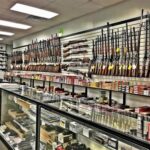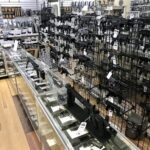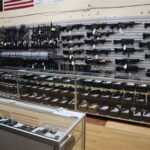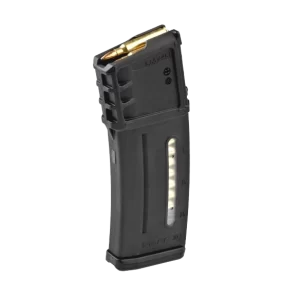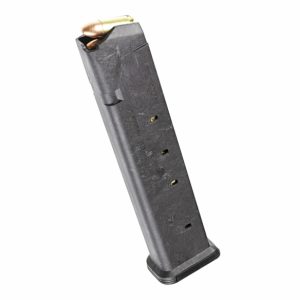Introduction To Firearm Safety Education
Firearms, when handled responsibly, can provide individuals with a sense of security and enjoyment. However, it is of paramount importance that anyone who owns or handles a firearm is equipped with the necessary knowledge and skills to ensure safety at all times. This is where firearm safety education becomes crucial.
Firearm safety education aims to provide individuals with the knowledge and understanding required to handle firearms responsibly. Whether you are a first-time gun owner or an experienced shooter, proper education in this field can significantly reduce the risk of accidents, injuries, or misuse.
This subtopic will explore various resources available for firearm safety education. We will delve into both traditional and modern methods employed to educate individuals on best practices for handling firearms safely. From formal training programs offered by certified instructors to online courses accessible from the comfort of your own home, there are numerous avenues through which one can acquire essential firearm safety knowledge.
In addition to discussing educational programs, we will also highlight the significance of resources such as books, manuals, videos, and websites dedicated to firearm safety education. These resources often cover topics including safe storage practices, proper handling techniques, transportation guidelines, and legal responsibilities associated with firearms ownership.
By becoming well-versed in firearm safety principles through proper education and access to valuable resources, individuals can play an active role in promoting responsible gun ownership while minimizing potential risks associated with firearms.
Importance Of Firearm Safety Training
In a world where firearms are prevalent, it is crucial for individuals to be educated on firearm safety. Firearm safety training plays a vital role in promoting responsible gun ownership and preventing tragic accidents. Whether you are a seasoned gun owner or a beginner, understanding the importance of firearm safety training is paramount. First and foremost, firearm safety training ensures that individuals possess the necessary knowledge and skills to handle firearms safely.
It teaches proper handling techniques, such as how to load and unload a firearm correctly, how to aim safely, and how to store guns securely. By acquiring these essential skills, individuals can minimize the risk of accidental discharge or mishandling that could lead to severe injuries or fatalities. Furthermore, firearm safety training instills responsible behavior and decision-making when it comes to firearms.
Participants learn about the legal implications surrounding gun ownership, including local laws, regulations, and permits required for carrying concealed weapons. This knowledge helps individuals make informed choices regarding self-defense situations while staying within legal boundaries. Firearm safety education also emphasizes the importance of safe storage practices. Properly securing firearms prevents unauthorized access by children or others who may misuse them intentionally or unintentionally.
This aspect of training reduces the chances of stolen guns ending up in criminal hands or being used in acts of violence. Lastly, firearm safety training promotes a culture of respect for firearms among gun owners. It emphasizes ethical considerations like treating every weapon as if it were loaded at all times and never pointing a gun at anything you do not intend to shoot.
Types Of Resources Available For Firearm Safety Education
When it comes to firearm safety education, there are various types of resources available to help individuals gain knowledge and skills in handling firearms responsibly. These resources cater to different learning styles and preferences, ensuring that everyone can find a suitable method to enhance their understanding of firearm safety. Here are some key types of resources that individuals can utilize:
1. Online Courses: With the advent of technology, online platforms offer comprehensive courses on firearm safety. These courses often include instructional videos, interactive quizzes, and downloadable materials for self-paced learning. 2. Printed Materials: Books, manuals, and pamphlets dedicated to firearm safety provide in-depth information on topics such as safe storage practices, proper handling techniques, and legal responsibilities associated with owning firearms.
3. Training Programs: Firearm safety training programs conducted by certified instructors provide hands-on experience with firearms under controlled conditions. These programs typically cover topics like safe handling practices, marksmanship skills development, and situational awareness. 4. Community Workshops: Local community centers or shooting ranges frequently organize workshops led by experts in firearm safety education. These sessions enable participants to learn from experienced individuals while engaging in discussions about responsible gun ownership.
5. Mobile Applications: Innovative mobile applications offer interactive simulations and virtual reality experiences that simulate real-life scenarios involving firearms. These apps can help users develop critical decision-making skills related to firearm safety. 6. Educational Videos: Video platforms such as YouTube host numerous educational channels dedicated exclusively to firearm safety education. These videos cover a wide range of topics from basic gun handling techniques to advanced shooting drills.
Government-Sponsored Programs For Firearm Safety Education
Governments around the world recognize the importance of promoting firearm safety education to reduce accidents, injuries, and fatalities related to firearms. To achieve this objective, many countries have implemented government-sponsored programs dedicated to educating individuals on the safe handling and use of firearms. These initiatives aim to provide comprehensive training and knowledge about firearms, ensuring that individuals possess the necessary skills to handle firearms responsibly.
One prominent example of a government-sponsored program is the National Firearms Safety Education Program (NFSEP) in the United States. Developed by federal agencies such as the Bureau of Alcohol, Tobacco, Firearms and Explosives (ATF), NFSEP offers a standardized curriculum covering various aspects of firearm safety. This program provides participants with valuable information on safe storage practices, proper handling techniques, and responsible firearm ownership.
In Canada, the Royal Canadian Mounted Police (RCMP) leads several initiatives aimed at promoting firearm safety education. The Canadian Firearms Safety Course (CFSC) is a government-approved program that educates individuals about firearm laws, handling procedures, storage requirements, and safe transportation practices. Additionally, provinces like Ontario also offer hunter education programs that focus on both hunting skills and firearm safety. Similarly focused on reducing accidents involving firearms is Australia’s National Firearms Safety Awareness Council (NFSAC).
NFSAC collaborates with state governments to deliver educational programs such as “Be Safe: Firearm Safety Education.” This initiative targets both licensed firearm owners and non-owners alike by providing vital information regarding legal responsibilities surrounding firearms ownership while emphasizing safe storage practices.
Nonprofit Organizations Offering Firearm Safety Education
In an effort to promote responsible firearm ownership and reduce accidents, several nonprofit organizations are dedicated to providing comprehensive firearm safety education. These organizations strive to equip individuals with the knowledge and skills necessary for safe handling, storage, and use of firearms. By offering a variety of educational programs and resources, they aim to empower both gun owners and non-owners in making informed decisions regarding firearms.
Here are some notable nonprofit organizations that focus on firearm safety education:
1. National Rifle Association (NRA) – The NRA is one of the most well-known organizations in the field of firearm safety education. They offer courses such as Basic Pistol Shooting, Personal Protection Inside the Home, and Refuse To Be A Victim® seminars that cover various aspects of gun safety. 2. Project ChildSafe – Supported by the National Shooting Sports Foundation (NSSF), Project ChildSafe is committed to promoting safe storage practices for firearms through educational initiatives.
They distribute free firearm safety kits containing cable-style gun locks and educational materials across the United States. 3. Eddie Eagle GunSafe Program – Developed by the NRA, this program focuses on teaching children what to do if they find a firearm in an unsupervised situation. It emphasizes four simple steps: Stop! Don’t touch! Leave the area! Tell an adult! 4. The Well Armed Woman – This organization caters specifically to women interested in firearms or those who already own them.
They provide a wide range of resources including training courses, online forums, local chapters, and self-defense seminars.
Online Courses And Tutorials For Firearm Safety Training
In today’s digital age, the availability of online resources has revolutionized the way we access information and learn new skills. The realm of firearm safety education is no exception. Online courses and tutorials provide a convenient and accessible means for individuals to receive comprehensive training in responsible firearm handling. One significant advantage of online courses is their flexibility. Learners can access these resources at their own convenience, allowing them to study at their preferred pace without disrupting their daily routines.
These courses often utilize interactive modules, video demonstrations, and virtual simulations to enhance the learning experience. This multimedia approach not only engages learners but also reinforces critical safety principles. Many reputable organizations offer online courses that cater to various levels of experience, from beginners to advanced shooters. These courses cover a wide range of topics such as basic firearm mechanics, safe storage practices, marksmanship fundamentals, legal considerations, and situational awareness.
Additionally, some programs incorporate real-life scenarios or case studies to educate learners on responsible decision-making when using firearms. To ensure the quality and credibility of these online resources, it is crucial to choose courses offered by recognized institutions or certified instructors who possess extensive knowledge and experience in firearm safety training. While online courses provide a solid foundation in firearm safety education, it is important to note that they should not be seen as a replacement for hands-on instruction provided by qualified instructors.
However, they serve as an excellent supplement or refresher for individuals seeking continuous learning opportunities or those who do not have immediate access to physical training facilities.
Local Community Centers And Gun Clubs Providing Firearm Safety Instruction
In an effort to promote responsible gun ownership and enhance public safety, many local community centers and gun clubs offer comprehensive firearm safety instruction courses. These programs aim to educate individuals on the safe handling, storage, and use of firearms, ensuring that participants possess the necessary knowledge and skills to prevent accidents and protect themselves and others. Community centers play a crucial role in fostering a sense of community responsibility by offering firearm safety education.
These centers often collaborate with local law enforcement agencies or certified instructors to provide structured courses that cover a wide range of topics. Classes typically include instruction on proper firearm handling techniques, safe storage practices, understanding state laws related to firearms, as well as addressing potential risks associated with firearms in the home. Gun clubs also contribute significantly to firearm safety education within their communities.
With their expertise in shooting sports and firearm proficiency, these clubs provide an ideal platform for individuals seeking practical training opportunities. In addition to organized shooting events, gun clubs often offer specialized classes on marksmanship fundamentals, advanced shooting techniques, self-defense strategies involving firearms, as well as advanced safety protocols. Both community centers and gun clubs prioritize creating a supportive learning environment where participants can ask questions freely and receive personalized guidance from experienced instructors.
By emphasizing responsible behavior around firearms through hands-on training sessions or simulated scenarios, these programs instill confidence while reinforcing essential principles of firearm safety. Whether you are new to firearms or seeking additional training to refine your skills further, exploring the resources available at your local community center or gun club is highly recommended.
Books, Manuals, And Publications On Firearm Safety Techniques
In the realm of firearm safety education, there exists a wealth of resources designed to inform and educate individuals about responsible gun handling. Books, manuals, and publications serve as invaluable tools that provide comprehensive guidance on firearm safety techniques. These resources cater to various audiences, including beginners seeking fundamental knowledge or experienced gun owners looking to refresh their skills. One notable publication is “The Basics of Firearm Safety” by renowned firearms instructor John Smith.
This manual serves as an excellent starting point for novices interested in learning about safe gun handling practices. Smith’s book covers essential topics such as proper storage and transportation methods, basic shooting techniques, and the importance of understanding local laws and regulations. For those seeking more advanced information on firearm safety techniques, “Mastering Firearm Safety: Advanced Strategies for Responsible Gun Owners” by Sarah Johnson is a highly recommended resource.
Johnson’s comprehensive guide delves deeper into subjects like situational awareness, defensive shooting tactics, and home defense strategies. With vivid illustrations and detailed explanations, this manual equips readers with the necessary skills to handle firearms safely in complex scenarios. Additionally, the National Rifle Association (NRA) publishes a series of instructional books that are widely respected within the firearms community. Titles such as “NRA Guide to the Basics of Pistol Shooting” or “NRA Guide to Firearms Assembly: Pistols & Revolvers” provide step-by-step instructions on safe handling practices specific to different types of firearms.
In conclusion, books, manuals, and publications play an integral role in educating individuals about firearm safety techniques.
Conclusion: Accessing And Utilizing Resources For Effective Firearm Safety Education
In conclusion, ensuring effective firearm safety education is crucial in promoting responsible gun ownership and minimizing the risks associated with firearms. Accessing and utilizing the right resources play a vital role in achieving this objective. By combining different types of educational materials, training programs, and community initiatives, individuals can enhance their knowledge and skills regarding firearm safety. Firstly, resources such as comprehensive guides, manuals, and online platforms provide valuable information on various aspects of firearm safety.
These resources cover topics like safe storage practices, handling techniques, transportation regulations, and laws governing firearms. Additionally, they often include practical tips to prevent accidents or unauthorized access to firearms. Furthermore, training programs offered by certified instructors are essential for those seeking hands-on experience with firearms. These courses not only teach the fundamentals of gun handling but also emphasize responsible behavior and decision-making when it comes to firearm usage.
Participating in these programs enables individuals to gain confidence while practicing safe firearm habits. Additionally, community-based initiatives can significantly contribute to effective firearm safety education. Organizations such as local shooting clubs or neighborhood watch groups often organize workshops or seminars focused on educating members about responsible gun ownership. These initiatives create opportunities for sharing experiences and knowledge among participants while fostering a sense of collective responsibility towards promoting safer gun practices within the community.
To maximize the impact of these resources for effective firearm safety education, it is essential that individuals actively seek out these materials and engage in ongoing learning opportunities.
Related















